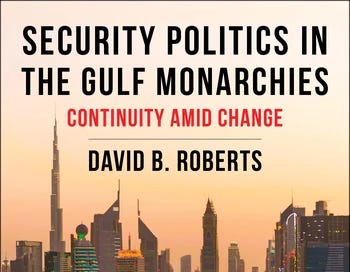Gulf Security and Gulf Insecurity
David Roberts' sweeping overview of change and continuity in the Gulf monarchies
David Roberts, Security Politics in the Gulf Monarchies: Continuity Amid Change (Columbia University Press, 2023)
Security has been at the center of the political and economic rise of the Arab Gulf states, which for better or for worse has been a defining development for the Middle East over the last decade. The increasingly independent foreign policies, regional and transregional interventionism, and aggressive new nationalism of the UAE and Saudi Arabia — and, most recently, the China-brokered rapprochement between Saudi Arabia and Iran — have been among the most dramatic indicators of these changes. has There’s been a deluge of books, articles, and punditry about these developments, but few have tried to put all those moving pieces together in a theoretically integrated and empirically informed way. David Roberts’s new Security Politics in the Gulf Monarchies, just published in my Columbia Studies in Middle East Politics series, boldly steps forward to fill that gap and should quickly become a standard text for both classrooms and general readers seeking to understand the rapidly changing Gulf.
There have been a lot of good recent books about elements of Gulf international relations, of course. Most recently, Dina Esfariandy’s New Order in the Gulf offered great insight into the driving role of the UAE, while Kristian Ulrichsen’s Qatar and the Gulf Crisis presented a definitive reading of that four year episode in regional dysfunction and public relations consultancy bonanzas and Adam Hanieh’s Money, Markets and Monarchies offered one of the most original and creative interpetations of Gulf political economy and its political/security implications you’ll find. But not since Ulrichsen’s 2011 classic Insecure Gulf has there been a book which specifically focuses on security in all its dimensions, from the societal to the environmental to the political. Drawing on an impressive range of sources and field research and a theoretical framework inspired by Barry Buzan and the Copenhagen School, Roberts deftly weaves together an analysis across multiple sectors - political, military, economic, social, environmental, societal - in the six monarchies of the Gulf Cooperation Council.
I spoke to Roberts about the book for the Middle East Political Science podcast this week. You can listen here:
Roberts begins from the theoretical approach to security associated with Barry Buzan and the Copenhagen school, a broad view of security which goes beyond the military dimension and which is carefully attuned to dynamics of politicization and securitization. This leads Roberts to a sectoral approach, in which security politics manifest in distinctive but interconnected ways. That theoretical orientation allows for sometimes unexpected insights into the interconnections between the societal and the political, the economic and the environmental, the rhetorical and the material. There is nothing polemical in the book, and no distinct policy orientation - just a clear-eyed, comprehensive and dispassionate look at security politics as they are.
This approach incorporates the traditional military elements of security, of course, including external interventionism, relations with the United States, and the challenges posed by Iran and other regional actors. But it embeds the military dimension within a much broader range of political, economic and societal dimensions and tracks its manifestation across them. Arms purchases, for instance, serve a security role in terms of generating the means for external power projection, but they also occupy a distinctive place within domestic and global political economies. The Iranian security threat has long justified the security positions and alliances of Gulf actors, but it also manifests across the societal level (justifying repression and surveillance of Shi’a citizens) - and took on a dramatic new form with the 2019 drone attack on the Saudi Abqaiq oil facilities.
Where Roberts book really stands out is in its ability to trace the politics of security across those multiple sectors and levels of analysis. The book shows how security politics shapes not only alliances and interventions, but also the relations between state and society. Political security occupies a central place here, in line with the long-standing trend within Middle East International Relations to emphasize the pursuit of “regime security” — leadership survival at all costs — over traditional “state security.” The pursuit of political security by these autocratic regimes has its own costs, of course, including the ruthless crushing of dissent, the systematic violation of human rights, and the creation of panopticon style surveillance societies. Roberts tracks those costs, and the attendant risks of repression mobilizing resistance and laying the seeds of its own demise. But he also tracks the real successes of leaders like Mohammad bin Salman and Mohammad bin Zayd in transforming societies from above and recasting the ruling bargains which sustain their popular legitimacy.
Security Politics in the Gulf Monarchies traces these dynamics in other sectors as well. The chapter on environmental security is a standout (for more on that, listen to my conversation with Tobias Zumbrägel earlier this year, based on his excellent book on the topic). The utility of incorporating the security framework really shines through, as the multidimensional impacts of climate change demonstrably impact economic security, societal security, and - at the extreme - the actual survivability of states over the long term. I highly recommend the book for undergraduate and graduate courses on the Gulf and the Middle East, and for all analysts and observers interested in understanding the political and security dynamics of a rapidly changing Gulf.




